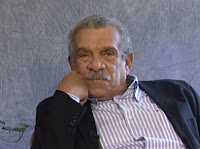Today in Language: Derek Walcott
 Derek Walcott, a master of the English language and incisive commentator on questions of postcoloniality, died today, March 17, 2017. He was comfortable in just about any literary genre, even the epic, and he won the Nobel Prize for Literature in 1992.
Derek Walcott, a master of the English language and incisive commentator on questions of postcoloniality, died today, March 17, 2017. He was comfortable in just about any literary genre, even the epic, and he won the Nobel Prize for Literature in 1992.Walcott differed from fellow Caribbean writers and theorists like Edward Kamau Brathwaite in that he wanted to appropriate the traditions of the English language and European literature for his Caribbean context, rather than oppose them outright. In this regard he is parallel to his deceased French counterpart, Aimé Césaire, but both men recognized and decried the historical situation that put created their social contexts.
In What the Twilight Says, for example, Walcott could write, “The common experience of the New World, even for its patrician writers whose veneration of the Old is read as the idolatry of the mestizo, is colonialism” (36). But he could also insist on the need not to be entirely defined by that history. He identifies writers who transcend the history of colonialism, a tradition of writers of which he was luminary:
The truly tough aesthetic of the New World neither explains nor forgives history. It refuses to recognize it as a creative or culpable force. This shame and awe of history possess poets of the Third World who think of language as enslavement and who, in a rage for identity, respect only incoherence or nostalgia. The great poets of the New World, from Whitman to Neruda, reject this sense of history. (37)

Comments
Post a Comment